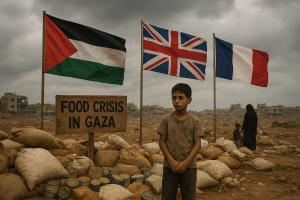In mid-2025, France and the United Kingdom made headlines by signaling their intent to formally recognize Palestinian statehood. For many, these announcements marked a long-awaited shift in Western diplomacy. France’s President Emmanuel Macron said that he would declare his support at the UN General Assembly in September, while UK Prime Minister Keir Starmer offered conditional recognition − dependent on Israel halting its military campaign, allowing humanitarian access, and ending annexations.

By: Beni Sukadis
Yet, despite these symbolic gestures, Israel’s siege and military operations in Gaza have continued with devastating intensity. The recognition, while politically significant, has failed to translate into tangible relief for Palestinians.
Recognition of Palestine by France and the UK is a diplomatic milestone, especially coming from G7 nations. But without enforcement mechanisms, it remains largely symbolic. Macron’s announcement was historic, and Starmer’s conditions − though more cautious − suggested a desire for meaningful change. However, experts warn that such declarations, especially in forums like the UN, do little to alter realities on the ground.
Israel has not shifted its strategy in response. The recognition hasn’t led to ceasefires, humanitarian corridors, or accountability. As one analyst put it, “Recognition may bolster long-term pressure, but it doesn’t feed starving families or stop bullets.”
Since October 2023, Israel has enforced a near-total blockade on Gaza. Food, water, medicine, and fuel have been systematically denied − even during brief ceasefires. In May 2025, despite repeated UN appeals, aid deliveries remained blocked. Tragically, over 1,300 Palestinians have been killed near distribution points, often while seeking food or medical supplies.
The destruction of farmland has compounded the crisis. By August, only 1.5 percent of Gaza’s cropland remained both undamaged and accessible. UN officials now warn of mass famine, with some labeling the blockade and targeting of aid hubs as war crimes.
Recognition by Western powers hasn’t stopped these tactics. The siege continues, and the humanitarian system is collapsing under bombardment.
On the other hand, Indonesia, long a vocal supporter of Palestinian rights, joined the chorus of nations reaffirming recognition of Palestinian statehood in UN conference recently. Jakarta’s stance was praised across the Global South and reinforced its leadership role in the Muslim world. However, like the declarations from France and the UK, Indonesia’s recognition has not translated into material change on the ground. Without mechanisms to enforce humanitarian access or pressure Israel diplomatically or economically, Indonesia’s support − while morally powerful − remains largely symbolic in the face of ongoing violence and blockade.
France and the UK’s recognition of Palestine sends a moral signal − but without economic or legal consequences, it lacks leverage. There have been no major sanctions, arms embargoes, or binding resolutions to enforce humanitarian access or protect civilians.
In effect, these gestures cost little and demand even less. Israel faces minimal diplomatic pressure and no material repercussions. Without consequences, recognition becomes a hollow statement.
International experts and media voices have grown increasingly critical. A Guardian op-ed described Western aid campaigns as “PR stunts,” accusing governments of complicity in Israel’s starvation tactics. Michael Fakhri, a senior UN rights expert, has gone further − calling Israel’s actions deliberate genocide and warning that the world can no longer claim ignorance.
Hospitals have been bombed, civilians displaced, and NGOs silenced. The humanitarian infrastructure is in ruins. Recognition of Palestine, while morally resonant, does nothing to shield Palestinians from this reality. France and the UK’s moves are not meaningless. They represent a shift in tone and could lay groundwork for future diplomatic pressure. But without enforcement − arms embargoes, international accountability, and protection for aid workers − recognition remains symbolic.
As one contributor stated: “The belated recognition of a Palestinian state is no more than window-dressing for as long as the Palestine that was remains under cruel military occupation….”. To make recognition matter, Western powers must back words with action. Otherwise, they risk offering empty rhetoric while Gaza starves.
The writer is senior consultant at Marapi Consulting & Advisory, Jakarta.
